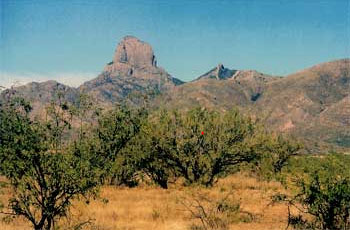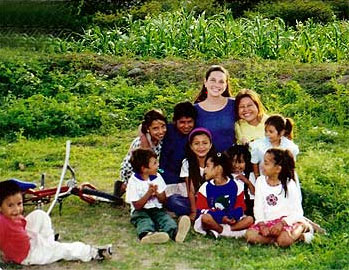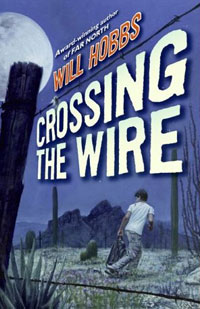|
||||||||||||||||||||||||||||||||||||||||||
 |
It’s an expression for illegal entry into the United States from Mexico across the barbed-wire cattle fence that separates the two countries along remote swaths of the border. Legal crossings take place at Ports of Entry in the border towns and cities. How and when did you start working on Crossing the Wire? For years, I had been snipping articles from newspapers and magazines, taping documentaries, reading books. So much of what we hear and read about illegal immigration is generalizations, statistics, and political arguments. I had been paying attention, but far more compelling were the human interest stories which told of the experiences of individuals trying to cross the border illegally. In the fall of 2003 I committed myself to researching and trying to write a story. I began by spending a week along Arizona’s border with Mexico, from Douglas west to the remote Tohono O’odham Reservation. I interviewed some people, but I also drove some remote roads and did some hiking.
It’s an amazing landmark. You can see it from lots of directions, often from seventy miles or more. It drew me like a magnet (see photo). Did you climb to the top? I love to read about the exploits of technical mountain climbers, but I’ve never done any vertical climbing. It took some steep bushwhacking to get fairly close to the base of the peak. I got a good idea of how scratchy and unforgiving those desert mountains are. I got close enough to think how scary it would be to try to cross the Lion’s Ledge. Did you already have Victor in mind? It was on that hike to Baboquivari Peak that I began to think about my main character. Who was he, where was he from, and why had he left home? What had he gone through to get this far? What were the twists and turns that led him to this forbidding landscape, and where was he trying to go? Very quickly I thought of interviewing my niece, who had lived with a family in a village in the mountains of central Mexico. Annie worked there for a summer on volunteer projects through Amigos de las Americas. My main character could be from that village. Is Los Arboles the name of the actual village? Is Victor a real person?Los Arboles is fictional, as are Victor and all the other characters. But yes, Victor’s village is based on the real-life one. Both lie below the mountaintop statue of El Cristo Rey, erected at the geographical center of Mexico. My idea was to learn all I could from my niece about the lives of people in that village (see photo). All that detail and texture would help me immensely in creating a character and visualizing the early scenes in the story. I had resolved to begin in Victor’s home village so that the reader (and I) could come to know his family and the life he was leaving behind, as well as his reasons for leaving.
Crossing the Wire seems so realistic. That’s what I was aiming for. The things that happen to Victor, Rico, Julio, Miguel, and others, are drawn from my research into the journeys of illegal immigrants. There’s a lot of randomness to what can and does happen—so many dangers and mishaps. You’d have to have tremendous determination to try it at all. To try it without the money to pay the coyotes (smugglers), you have to be desperate and very brave. You mentioned in your Author’s Note that ever since 9/11, it has gotten a lot more dangerous for people without documents to make their way across the border to seek work in the U.S. Why is that? Increased security in the border towns and cities has deflected most of the illegal crossers to remote stretches of the border. In 2004, when Crossing the Wire takes place, more than half of all illegal crossings were into Arizona. The same held true in 2005. Hundreds die in Arizona’s deserts every year. Many of the dead are never identified. Was the story easier to write because you had learned so much of what happens to people trying to cross the border without documents? It turned out just the opposite. At every point in Victor’s journey, I could picture lots of different things that might happen. Through several drafts, I tried out quite a few options that, once I pursued them, seemed to derail the story. You’re always trying to figure out what will give the story the shape that will make it fly. As you were researching the story, did you get close to where Victor crosses the border, where it’s just a barbed wire fence? Yes, by traveling a remote road south in the Tohono O’odham Reservation. The reservation has about seventy-five miles of border with Mexico, and is heavily patrolled by our Border Patrol. Because it is so remote, the reservation has become one of the most commonly used crossing areas. Did you feel the presence of danger? Jean and I were very jumpy. I had learned that heavily armed drug smugglers are crossing the border all the time. I thought I was two or three miles from the border when I saw the flashing lights of a Border Patrol truck in my rear-view mirror. I stopped where the deserted road was making a sharp left turn. The patrolman pulled alongside and asked what we were doing. “I’m a writer researching a story,” I said. “I was hoping to get close to the border but not too close.” He pointed at a barbed wire fence no more than a hundred feet away. “You’re looking at it,” he said, and suggested I turn around. What else did you see? On the way back to Tucson that day, we saw a drug bust along the side of the road. I saw many bales of drugs wrapped in brown tape I later described in the novel. The headlines in the Tucson paper that day were about a deadly shoot-out on the interstate between rival coyote gangs. One gang had picked up a group of illegals that “belonged” to the other. Victor and Rico hear about an incident like that. Now you know where it came from—real life. Unfortunately, those sorts of incidents are all too common. There’s a tremendous amount of criminal activity on both sides of the border that goes hand-in-hand with illegal immigration. It’s part of the “big picture” of this complex and controversial subject I hoped to provide readers as they followed Victor from his home in Mexico to his first job in the States. Have you ever known any field workers like Victor? My first job out of college was six weeks of picking fruit alongside a dozen or so men from Mexico. The orchard was in Emmett, Idaho. The men spent almost nothing on themselves. Their paychecks went directly to their families back home. What were they like? They were friendly and had a great sense of humor. It was really hard work, and they worked like you wouldn’t believe. There was only one day when I managed to pick as many bins of apples (six) as the best pickers. I’ve carried a lot of respect for those men over the years. As you learn in Crossing the Wire, it has become difficult to impossible in recent years for migrant workers like the ones I knew to return home for part of the year. Imagine the impact on them and their families back in Mexico, and then consider all those deaths in the desert. There has to be a better way. By the time you are reading this, perhaps we have begun to solve some of the many thorny problems involved in illegal immigration. |
|




